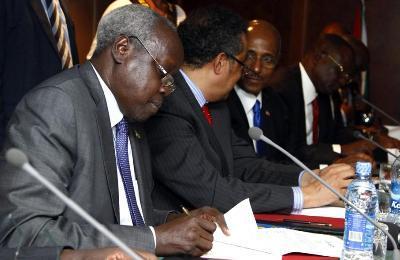S. Sudan sets out preconditions for peace talks with rebels
March 20, 2014 (JUBA) – The South Sudanese government on Thursday said it would only participate in the second round of peace talks with rebels if mediators from regional bloc IGAD excluded seven senior politicians in Kenya from the negotiations.

All of the senior members of South Sudan’s ruling party (SPLM) accused of trying to oust president Salva Kiir in mid-December have denied the claims, insisting the conflict was caused by fighting from within the national army (SPLA).
The government has urged mediators from the East African regional bloc not to allow the seven politicians, now living in the Kenyan capital, Nairobi, to join the talks as a third grouping.
Both the SPLM and the rebel SPLM/A in Opposition have also shown little interest in the involvement of South Sudanese civil society groups in peace talks.
Cabinet affairs minister Martin Elia Lomuro told reporters on Thursday that the government and other political parties in the country were in consensus that talks be limited to those directly involved in the armed conflict, rejecting the participation of a so-called third bloc in negotiations.
“An objection letter will be taken by our chief negotiator to the mediators. This objection letter represents the clear views and stance of the leadership of this country. All the political forces have agreed that negotiations should be confined to the government and those who are carrying arms and engaging the in this senseless conflict,” said Lomuro.
Following their release, the seven officials decided against joining the SPLM in Opposition which is being led by Riek Machar, South Sudan’s former vice president.
The armed opposition and the government have both been accused of widespread abuses in the conflict which has killed an estimated 10,000 people and displaced more than 900,000. According the United Nations, 40 per cent of South Sudanese people are now in need of aid.
In a statement broadcast by the state-owned SSTV on Tuesday, information minister Michael Makuei said that president Kiir had been ignored by IGAD after he told a summit that he rejected the participation of the seven officials.
However, IGAD member countries included in the end-of-summit communique not only said that the seven officials should be allowed to participate in the talks, but demanded that another four officials who are facing trial in Juba on charges of treason also be released to take part.
“The president stated it clearly at the summit; nevertheless the communique by IGAD member countries included the demand for the release of the detainees and the participation of those who called themselves SPLM leaders,” said Lueth.
The minister said the SPLM leadership and other political parties had agreed to send an official objection letter to the IGAD chairman – Ethiopian prime minister Hailemariam Desalegn – resolving not to participate further in the talks until the matter is resolved.
The government spokesperson argued that their objection was based on the lack legitimacy of the group of seven to participate in the negotiations.
“We are saying these people should not participate because they are not stakeholders. So our chief negotiator will be going ahead with the letter of protest,” he explained.
Talks were scheduled to resume on 20 March, but it appears the government’s objection to the participation of the seven politicians will further delay the resumption.
It is also unclear whether rebels would participate in the talks after the government recaptured Malakal town, the capital of South Sudan’s oil-producing Upper Nile state, on Wednesday.
The release of the remaining four political detainees and the participation of the seven politicians have also been one of the conditions set down by rebel officials participating in the talks.
They have also demanded that the Ugandan military, which deployed its forces to support the government, remove its troops from South Sudan.
The rebels have also rejected to the inclusion of some of their stronghold areas in the ceasefire monitoring and verification mechanisms, stressing the areas have not witnessed any armed engagement and therefore do not warrant inclusion in the process.
At the venue of the talks in Addis Ababa, rebel negotiators were present on Thursday evening team but the government’s delegation failed to arrive.
A rebel figure at the talks told Sudan Tribune that Kiir had “provoked our positions in Malakal by attacking [our forces] for the last three days”, accusing the government of not being interested in peace.
(ST)
